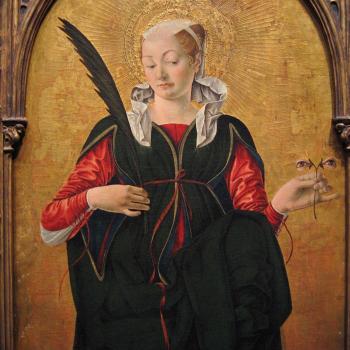
This week, I’ve been really struggling to find something to write about. With my Facebook feed enraged about any number of things, of late it sometimes seems the best thing any of us can do is to simply stop contributing the incessant flood of enraged (be that self-righteous or even righteous) emotions that just won’t stop. But the fact is, it is far easier to slam out 800-1200 words about what makes you mad than it is to offer a salient, cohesive, reflective, and civil discussion. If you don’t believe me, break the rules and read the commboxes.
Regardless of whether this is actually the virtue of prudence or the reality that I am simply not always brilliant, witty, thoughtful, and reflective (probably it’s the latter), I have been experiencing yet another round of the dreaded writer’s block. My friend Matt Sewell (check out our podcasting over at Mountain Catholic!) suggested I write about whatever God has put on my heart, and I replied that lately all I seem to think is “wow, I really have nothing to say” and as a way of avoiding that thought, “wow, look at all these things Socrates had to say. Where did he get those nice things?”

But why? Why is it a problem to me if God doesn’t want me to write today? I approached this blog initially because, through praying about it and discerning that this was an opportunity to use a skill God had given me (and a timely reading about the talents parable around the time I was invited to write it) and that I owed it to him and to those who had financed my education to use what I know to (hopefully) help others come to know and love God more. So, if my prayer was giving me nothing to say, then why should that bother me?
Because pride.
This seems to be the root of so, so many of my problems. Like my priest said in his homily this past Sunday, we all think that we are fundamentally good people. That’s why Jesus had to remind us to take the plank out of our own eyes first.
It’s so easy for blogging to lose sight of God, to lose sight of how I can love my neighbors and help them love God more, and instead become all about me. About my wit, my insight, my thoughts, my popularity. In some way this is the nature of the beast, what with branding and the internet and those super awesome page click numbers.
Social media probably doesn’t help. I mean, who of us out there doesn’t get a bit of a dopamine hit when someone likes our picture or status or shares something we said? I’m not saying you like it, or think it is good, or want it to happen. I’m just saying it does.
In all this, I got to thinking: What if I couldn’t write? What if I wasn’t able to think like I do? What if I couldn’t read anymore? What if I wasn’t given an education? What if I didn’t have my skills and talents? What if I was me, but all of those parts that I most identify with my “me-ness” were gone?
Where do those questions and the fear they inspire, at root, come from? My pride.
They come from my (deeply buried) belief that I somehow deserve any success, accolades, acknowledgement, esteem, “love,” as if it was intrinsically mine, and not due to the fact that God has given given me these talents for some predestined purpose.
What have you, that you did not receive? Now if you received it, why do you glory as if you had not received it?
Why indeed? Take away all those things we could be loved for; imagine yourself unable to speak, unable to move, unable to communicate, unable to share any of your “me-ness” or those qualities that we so often were simply given and cannot take credit for. Imagine for a moment that you have become what our modern vernacular might sadly consider an “economic drain on resources” and ask: what have you?
So faith, hope, and love remain, these three; but the greatest of these is love.
Ultimately, those are the theological virtues, the indwelling of the Holy Spirit in our souls. And if our minds are turned to God and dependent upon Him, then these virtues remain not because of anything we have done, but because while we were still sinners, Christ died for the ungodly. Strip away everything that any of us could attempt to claim as our own, and what will remain in stark clarity is the truth that it is all that we have is what we have received, and those gifts which are most obviously received are what have the most enduring permanence in us. On our own? All have sinned and fall short of the glory of God.
Why do we love our neighbors? Because God loved us first. Why do we exist? Because God saw that it was good.
Certainly, we must act in accord with God. And how this predestination that involves free will works is one of the great mysteries of predestination. But the fact that it exceeds the ability of our minds to fully grasp it does not make God’s grace any less real. And God loves us not because of who we are or what we do, but because God is Love.
So in my silence, I would be foolish to fail to recognize the fact that God has loved and given life to those who also are seen as “economic drains on our time, energy and resources.” If nothing comes entirely from my own works, except sin, how can I fail to recognize all life is a gift not because of what it contributes but because it is. And how particularly true is this of those we so often ignore: the unborn, the elderly, the sick,
those facing various physical and mental challenges. The “disposable.” The ones who seemingly contribute nothing. The ones who seemingly don’t have the qualities like all of us older, healthier, more “able” individuals do.
And yet, what have you, that you did not receive?…And the greatest of these is love.
Creation, redemption, sanctification: these are all gifts. Even the mundane things: the ability to sing or play a sport or write or speak another language or wear heels or hike or feed ourselves are gifts. We may have cooperated, but they all go back to our existence as ourselves, and no one of us can claim to have not received that.
So remember the words of St. John the Evangelist: if God so loved us, we must also love one another.












